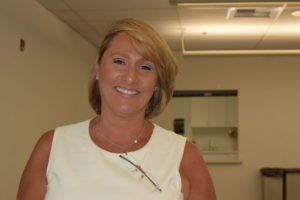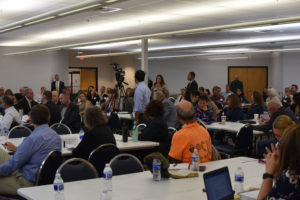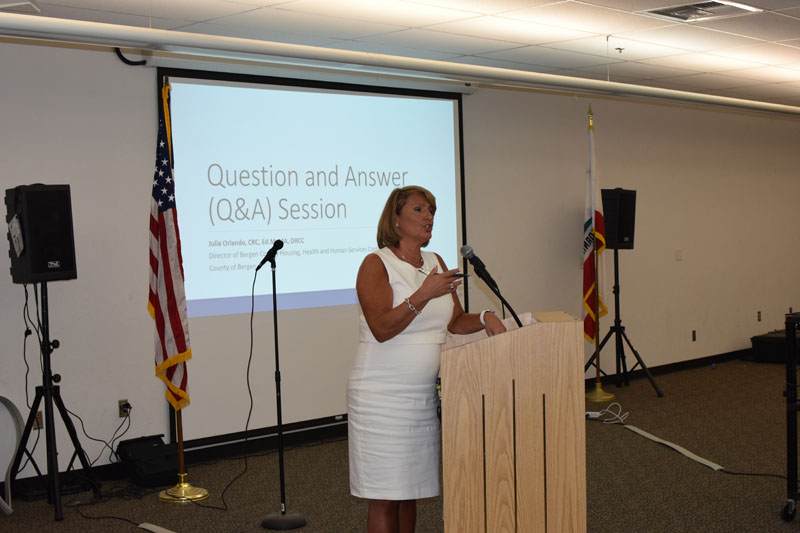
Julia Orlando came to town Friday. Orlando is the Director of Bergen County’s Housing, Health, and Human Services Center. She achieved nationwide fame in 2017, when the New Jersey County became the first officially recognized county in the United States to end chronic homelessness, defined as including people “who have experienced homelessness for at least one year or repeatedly while struggling with a disabling condition.”
With decades of experience developing social services and a Master’s Degree in Psychology from Columbia University, Orlando applies an unusual mix of on-the-ground experience and advanced training to a problem she says is, “a crisis. It’s a disaster.”
What may be most unusual about Orlando’s approach to a, “sustained end of homelessness,” is her willingness to deliver the blunt truth to people who don’t want to hear it. After emphasizing that with regard to ending homelessness, “Everything is about political will,” she delivered a series of unpleasant realities to a packed house at the Salida Public Library in Stanislaus County.
She said that when addressing homelessness, it’s important that solutions be designed like a, “crisis response.” In addition to political will, she said it’s important to have a clear purpose.
Bergen County chose the Housing First model, and Orlando said that meant having clarity of purpose about exactly what county officials wanted to do. When a local official asked her what to do about high percentages of drug addicts and mentally ill people among the homeless population, she prefaced her response by saying, “You’re not going to like this.”
What many people don’t like about Bergen County’s approach to ending homeless is the county’s leaders’ honest assessment of what it takes to address what is in most states on the west coast an escalating crisis. And it’s most likely an escalating crisis because too many political leaders haven’t yet faced a series of unpleasant truths about what it’s going to take get people off the streets.
To questions about addicts and the mentally ill, she responded, “Our goal was to get them housing, not undo the things they’d done. But Housing First doesn’t necessarily end with housing.” Orlando said many people will need services after they’ve been housed.
She added observations like, “If you don’t make shelters what people need them to be, they’re not coming into the shelter,” but, “Shelters should not be housing.”
Much of what Orlando had to say goes directly against the grain of the conventional wisdom, which frames homelessness in terms of choices and sees most attempts to help homeless people as, “enabling.” She said,
“If you really want to get people off the street, you have to do it on their terms.”
She went on, “Get rid of the rules. We dropped the rules—low barrier, no barrier—our goal was to get them to housing.”
“You have to meet people where they are. If you want to get people off the streets, you have to build things they want to go to.”
Orlando’s words were clearly discomforting to many in the packed audience, but among those who are out daily among homeless people there were a great many nodding their heads in approval.
They’ve already learned that homeless people prefer homelessness to the dirty, vermin-infested places that are too often their only other options. They also prefer homelessness to having to abandon pets or be separated from their spouses. In that regard, they’re no different than other people.
There will be those who argue that because Bergen County is relatively wealthy and its homeless population much smaller than in many California counties, solving homelessness was much easier there. But another unpleasant message from Julia Orlando was that solving homelessness is very hard, even for places like Bergen County. She repeated, “It’s so hard,” several times and added that homelessness won’t be solved except by collaboration among all members of a community.
She also pointed out what could be the ultimate barrier for dealing with homelessness in the San Joaquin Valley when she said, “Funding is going to upset people.” Ending homelessness is going to cost more money than most people imagine, but Orlando also had an answer to that problem.
“You’re already paying,” she said. She said people need to measure the costs of Emergency Room visits, law enforcement, and social services against the reduced expenses of housing. She emphasized the harm to businesses from having homeless people visible and under foot near their workplaces. She could have added the loss of property values when homeless people frequent parks and nearby neighborhoods.
 Most studies have indeed shown that housing people is cheaper in the long run than leaving them on the streets. The challenge for everyone is going to involve abandoning preconceived notions and admitting past practice hasn’t worked.
Most studies have indeed shown that housing people is cheaper in the long run than leaving them on the streets. The challenge for everyone is going to involve abandoning preconceived notions and admitting past practice hasn’t worked.
That challenge will first have to be met by political leadership, which is why Orlando said emphatically and more than once, “Everything is about political will.” But community leaders will also need to know voters support their efforts.
“It’s so hard,” said Julia Orlando, and she’s right. It’s going to take entire communities to get where we all want to go, but at least we’ve been given a good set of directions from someone who knows the way. Now we just have to follow them.


Great article.
Agreed.
As someone who is doing this work, albeit from the health care side and as a representative from a small city, nothing she said was revolutionary. But it definitely ruffled the feathers of the elected officials and community members who refuse to understand what housing first truly means. I hope beyond measure that her message sunk in.
Bravo, Ms. Talbott. Bravo.
The message at the symposium was clear and credible. We cannot be a community that vilifies or ignores those in need. It is possible to solve this problem with will, resources and message. And don’t forget pets are family. Keep our families bonded.
I believe Salt Lake City in Utah adopted the approach proposed by Ms Orlando. Worked out very well. The annual costs of EMT’s police and ERs went way down. And it was a humane and civilized way to truly help the homeless.
I have always been aghast at the inhumane policy of separation of pets from their humans. It’s no wonder that so many homeless chose to stay on the street rather than give up their pets.
Well done, Eric! It’s hard not to agree 110% with Ms. Orlando, with the homeless population’s desire to have their spouses and pets accompany them to new housing, to seeing the eventual reduction in cost of police, EMT and other public services….what is hard when speaking Truth to Power is to have not just the power brokers’ ears open, but their hearts and minds open to these facts as well because only with open hearts and minds will they get past the bean counting and the notion that they’re “managing a nuisance” and get with a broad, long-term and humane program the the citizens of Modesto and the cities of Stanislaus County will fully support.
Well said, BAW. Now we have to open the ears of our local leaders.
Wonder how many folks really know what ‘meeting them where they are’ is like and how hard it is not to impose our views and values on them? Maybe a little judgement too! The latest chatter is all about showing them who’s boss; if they don’t take our offers of shelter we’ll lock em up! Good luck on that tried and trued method. You might call it a worst practice!!
We are dealing with a Homeless Situation behind our building. For now they have agreed with us to stay behind the building and keep our front clear. That is not appreciated by other business who call the police, but if the police make them move they just go out on the street beside Jack In The Box. The problem is they seem to be collecting more and more items, that are stacked up at the back. Meetings are fine but what other action is available to help them. There is a lot of spare land and units near the Gospel Mission that could be utilized into housing as Julia Orlando suggested.
Thank you Ms. Scott. At this point, the best current approach to homeless people and their belongings is at the Modesto Outdoor Emergency Shelter (MOES). Even there, periodic cleanup and disposal of things people have collected is a must. Perhaps you could recommend MOES as an alternative to your business.
Homelessness…
to have no where to rest your head, No where to keep good hygiene. No where to make a meal, no where to have an I.D. mailed too. Yes they do seem to collect a lot of stuff, but that stuff is all they have, and I am confident if they had somewhere to store it or clean it or work on it you would not be seeing it and filling our land fills with things that they actually needed/wanted!!
It just makes me sick to see and hear with my own eyes what city officials (park people-police-tent city staff) have just given no regard to humanity. I am a functioning working adult lived in this town since 1997, since then I have met a man 10 yrs ago who was homeless and I didn’t know it until 3 months into seeing him. He lived with me for a couple of years and refused to work and help pay living expenses so after a long back and forth battle (years) we have come to understand that you can;t make some one work and want to pay bills. Yes I am still together with him and frankly I don’t think it will ever change. He is a kind person. He has had many camps that he has made in parks invaded by other homeless, police, park people when you take someones bed and blankets in the middle of a winter day-what the heck do you think is going to keep them warm that night?? They don’t stay all day where there beds are made, so when they return and its dark and cold outside… you see where I am going with this I hope. Yes some are well most are very messy, but that is mostly because our community has made them feel like they are not worthy of anything much less offer to help i any small way. I currently am unemployed have a A.S. degree in business administration and I have had to take any job I could get to pay my rent being a single mom. If I can be of service in our community to help these folks get things together please call me I am more than capable of talking and treating these people, I happen to know many personally and I would really enjoy getting this crisis under control or how ever you would like to say. Get them housed and see what they can give back.
Thanks for reading and please call if you have a career in mind for me I am sick and tired of taking the first job offer I get, Go work and get laid off in two months. 209-450-0898
My experience, as a former R.N., now disabled, and homeless @ Ms, Orlando’s shelter, she’s Evil, she’s a Control freak, she’s Bogus, with a Great Big Ego. No one is treated with any Dignity whatsoever! No one is ever provided with answers to queries of their individual status, or other. Rather, one is constantly threatened to be ‘written up’, or ‘Discharged’ , just for asking–“what are my choices?”, or ‘what is the plan for me? ” She responds with Lies, and exploits any weakness, the residents have, and refers them for a ‘Pych eval.’, or simply Barks ” you can leave”. Enter Corona virus—-her staff made me leave with the Sheriff’s escort.
All others, predominently welfare recipients, pt workers, and the mentally I’ll, or drug/alcohol addicts were placed in motels. I am on the street, a most uncivilized experience, bc Ms. Orlando has refused to uphold her responsibilities. This person has too much power, and it’s time she stopped getting away with abusing such under the guise of helping the homeless. To her, we are all lazy, irresponsible people, Her real life tactics remain dangerous to me. It is she who can’t handle the truth.